Survey: Flexible work rises as top perk
Zoom commissioned a Morning Consult survey of 4,000 knowledge workers across the U.S., U.K., Germany, Australia, and Singapore to learn what benefits people look for from today’s companies and sentiments about hybrid work as a benefit. The results indicate that flexible work location and flexible work hours are of top importance — only behind competitive pay and benefits packages, across all countries surveyed.

-
01Flexible work as a core benefit
-
02Consistency across countries and generations
-
03Where (and how) work takes place
-
04How flexible work impacts employee engagement and retention
We can never have enough hours in the day — with our loved ones, for ourselves, or just to get everything done that we need to. Having more time is a luxury, one that many employees feel fortunate to enjoy lately.
That’s because the acceleration of flexible work over the last several years, coupled with advancements in technology, have given many of us valuable time back. When we get to work when and where we want, we get to take better care of our personal and professional lives.
Zoom partnered with Morning Consult to explore how today’s workers feel about flexible work. Many employees now view flexibility as a key benefit from their employers — but what does flexible work look like? It can mean different things, whether you’re a fully remote employee, one who goes into the office daily, or have a hybrid schedule. Still, flexibility is ultimately about having options regarding where or when you work. And for most employees, that matters more than other common perks.
Our survey explored these questions and more, with a few top findings emerging:
- 43% of all survey respondents believe that flexible work is no longer a perk, it is a basic expectation.
- 70% of all survey respondents would consider leaving their current job for a more flexible working environment in the future.
- Knowledge workers think many aspects of work are better remotely than in the office. The top aspects of work that are better remotely are time spent commuting, safety from COVID-19, fewer expenses, more freedom, time with family, less environmental impact, ability to live wherever, better work-life balance, and managing childcare.
Read on for a more in-depth look at the survey findings.
Flexible work as a core benefit

We wanted to understand how today’s workers weigh certain benefits. Is free lunch more important than wellness dollars? Does a benefits package — healthcare coverage, dental plan, and more — outweigh the ability to work flexible hours? Among all countries surveyed, flexible hours and scheduling (75% of respondents ranked this in the top five most important benefits) comes in second behind pay (81%). Flexible work location comes in fourth (64%), right behind a benefits package (74%).
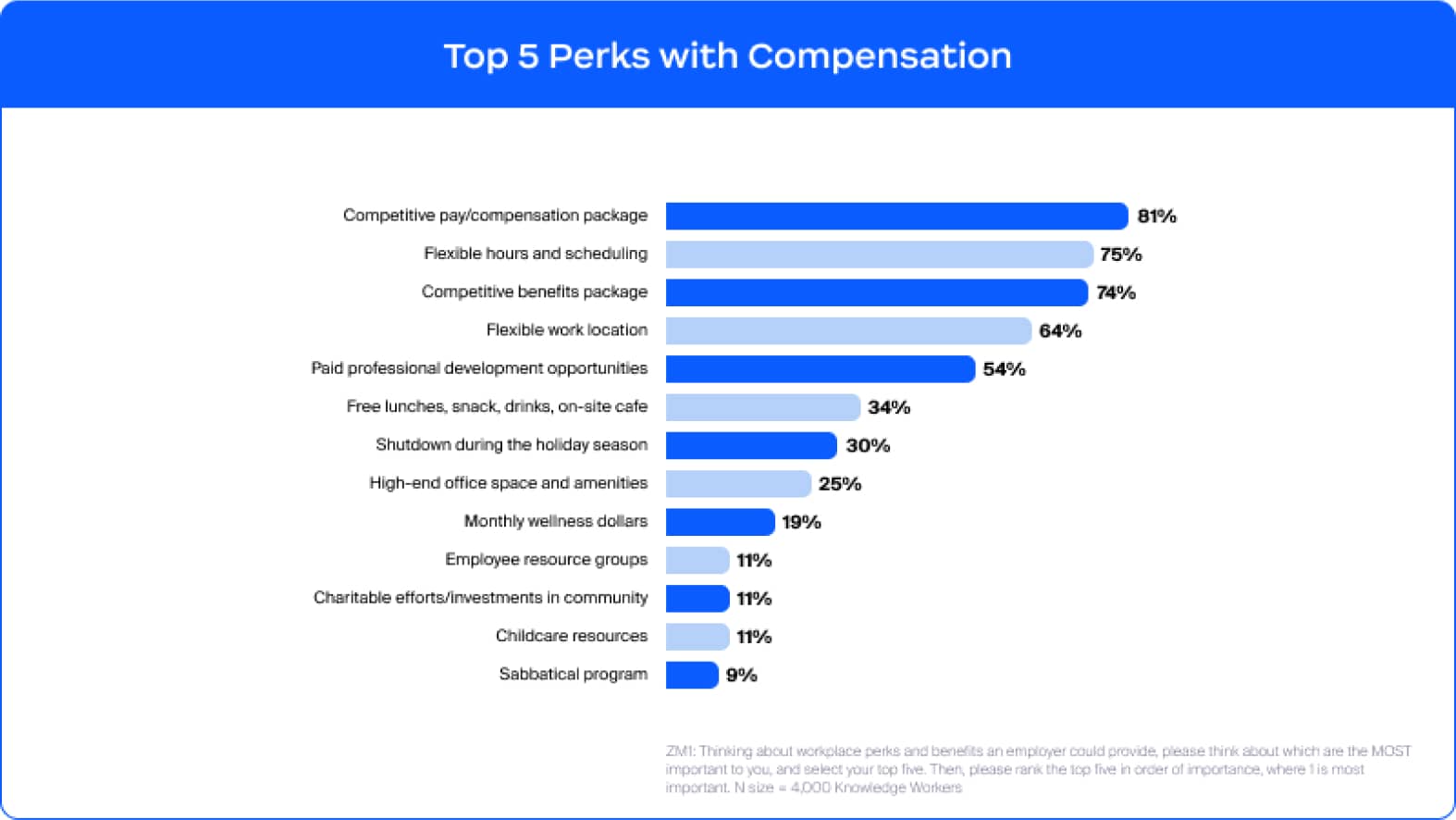
However, without compensation and benefits as considerations, flexible hours and location are in the top tier of importance. Flexible hours and scheduling comes in at 85% and flexible work location at 78%.
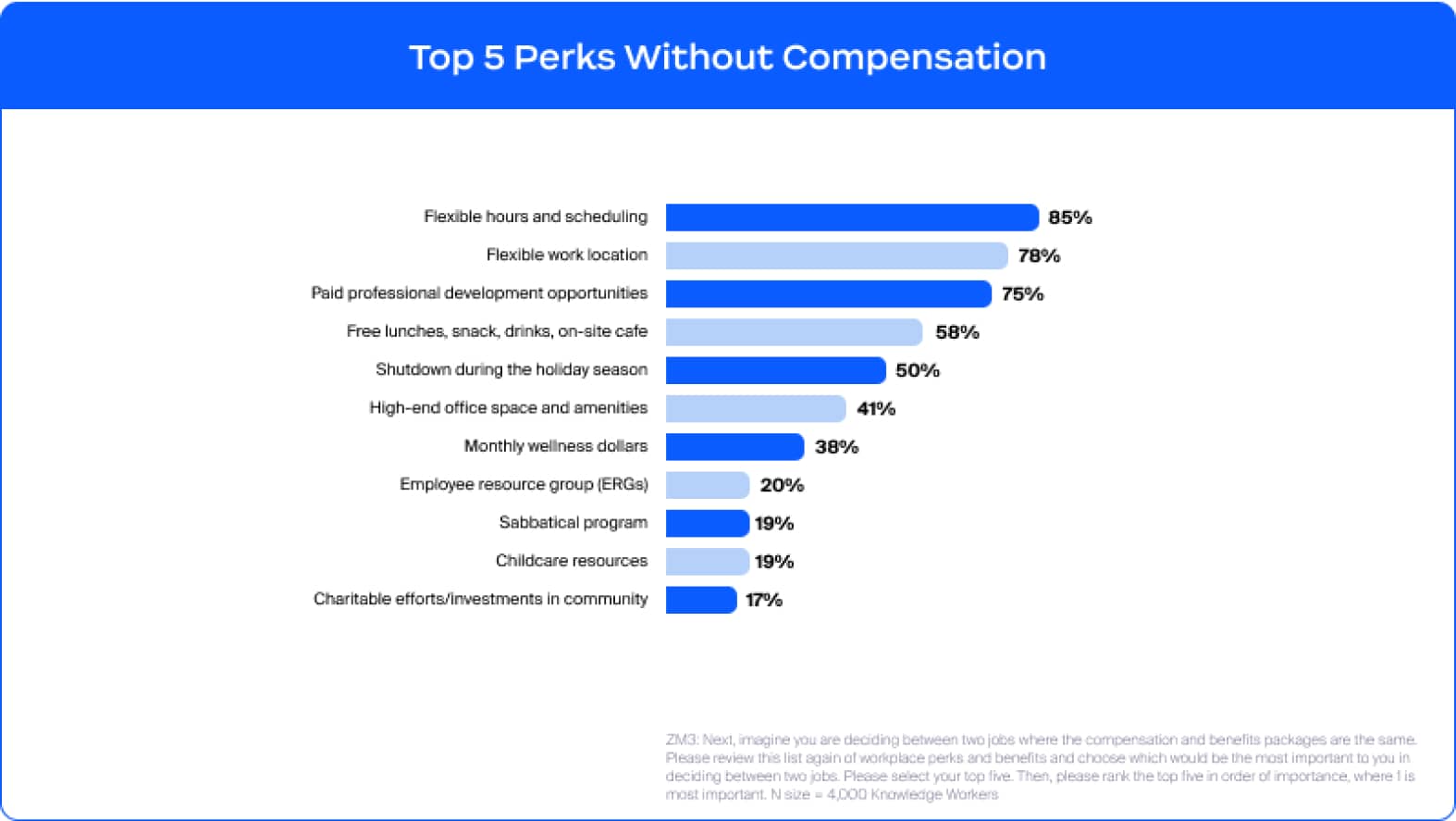
Consistency across countries and generations

Workers across all generations value flexible work as a core perk, but some weigh it heavier than others. For example, for U.S. respondents, flexible hours and flexible work location are second only to pay and benefits, with both being more important to Gen Z/younger millennials (under 30) and millennials than their Gen X and boomer counterparts.
79% of Gen Z and younger millennials (under 30) preferred flexible hours to any other workplace perk
72% of older millennials (age 27-42) preferred flexible hours to any other workplace perk
69% of Gen X (age 43-58) preferred flexible hours to any other workplace perk
69% of boomers (age 59-77) preferred flexible hours to any other workplace perk
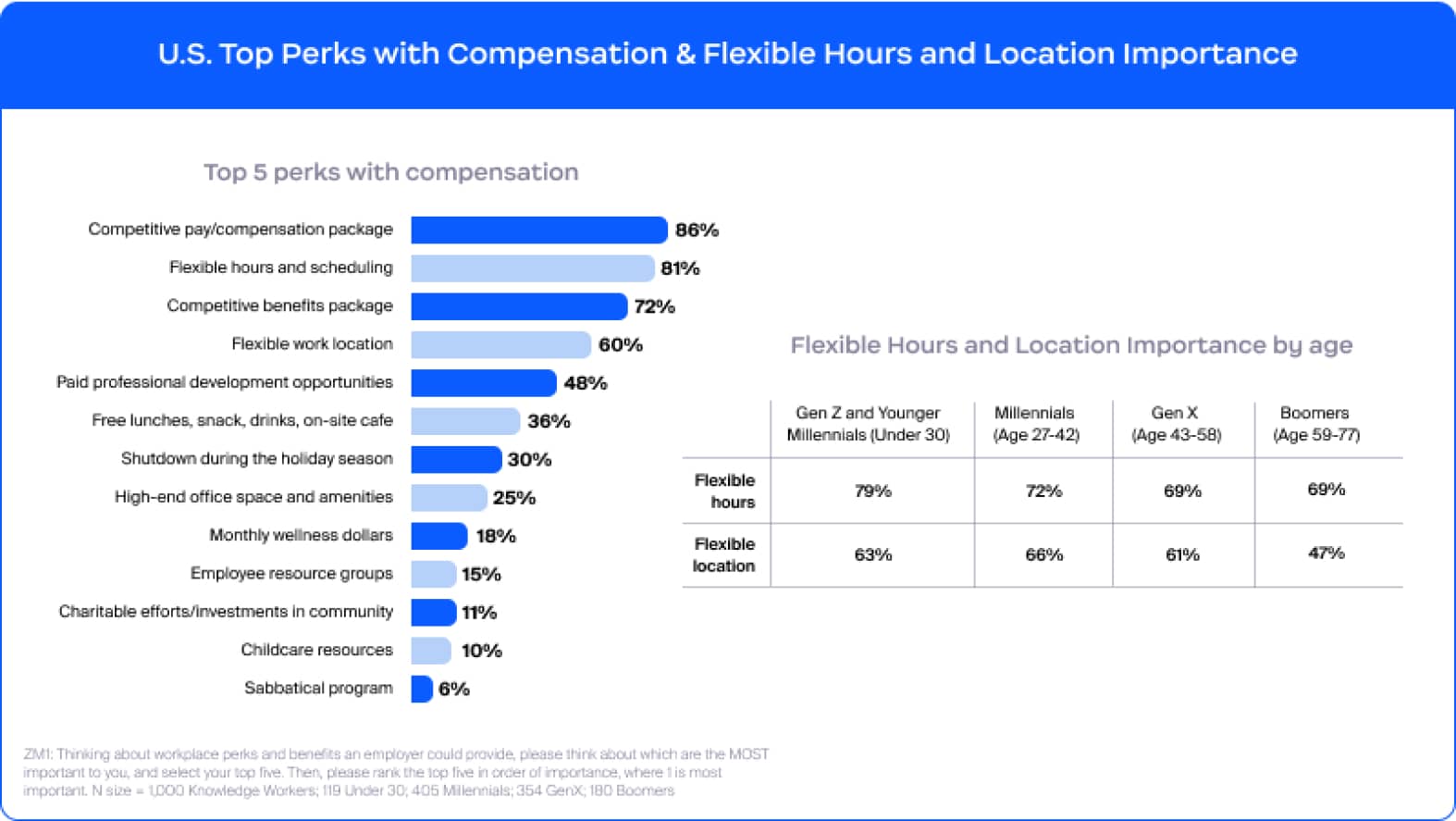
The ability to choose their work location is consistently important across all surveyed generations and countries. Whether that’s 80% of Australians or 77% of Germans, just about three-fourths of respondents in every surveyed country care about having a say in where they go about their workday. And according to Gen Z and millennials, that choice is very important — with 42% of U.S. Gen Z and younger millennials and 48% of U.S. older millennials agreeing.
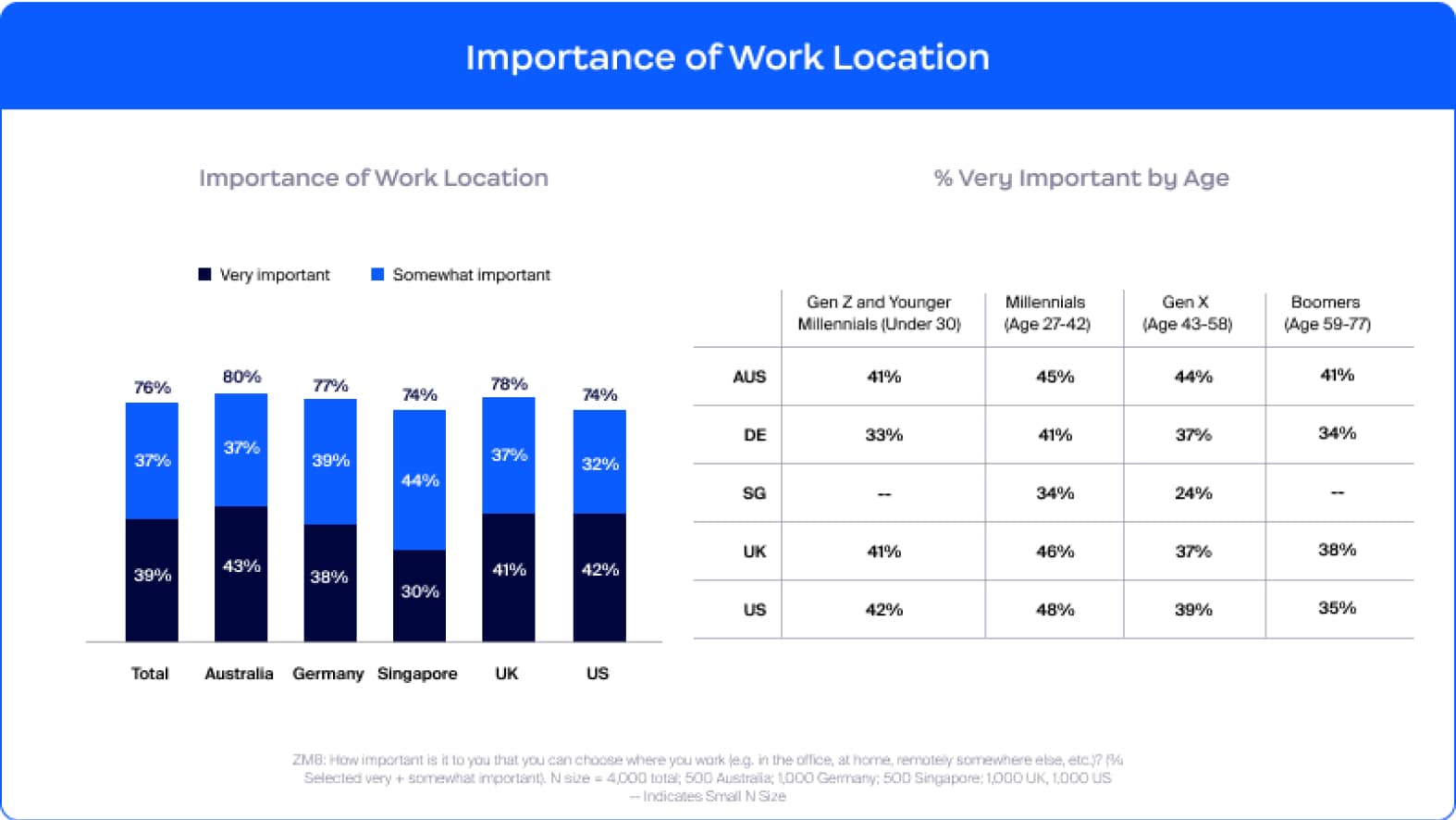
Where (and how) work takes place

Remote work isn’t anything new to survey respondents. The majority of those surveyed expressed they had worked remotely either before or starting with the pandemic. U.K. respondents had the most experience, with 89% having worked remotely before or starting with the pandemic, followed by 88% of Singaporean respondents, 84% of German respondents, 81% of Australian respondents, and 72% of U.S. respondents.
And many want to keep it that way, or at least hybrid. 89% of all respondents want to either work a hybrid or flexible schedule or work remotely, with the U.S. almost an even split on remote (43%) and hybrid (41%). Australia (57%), Germany (62%), Singapore (65%), and the U.K. (59%) prefer hybrid or flexible work.
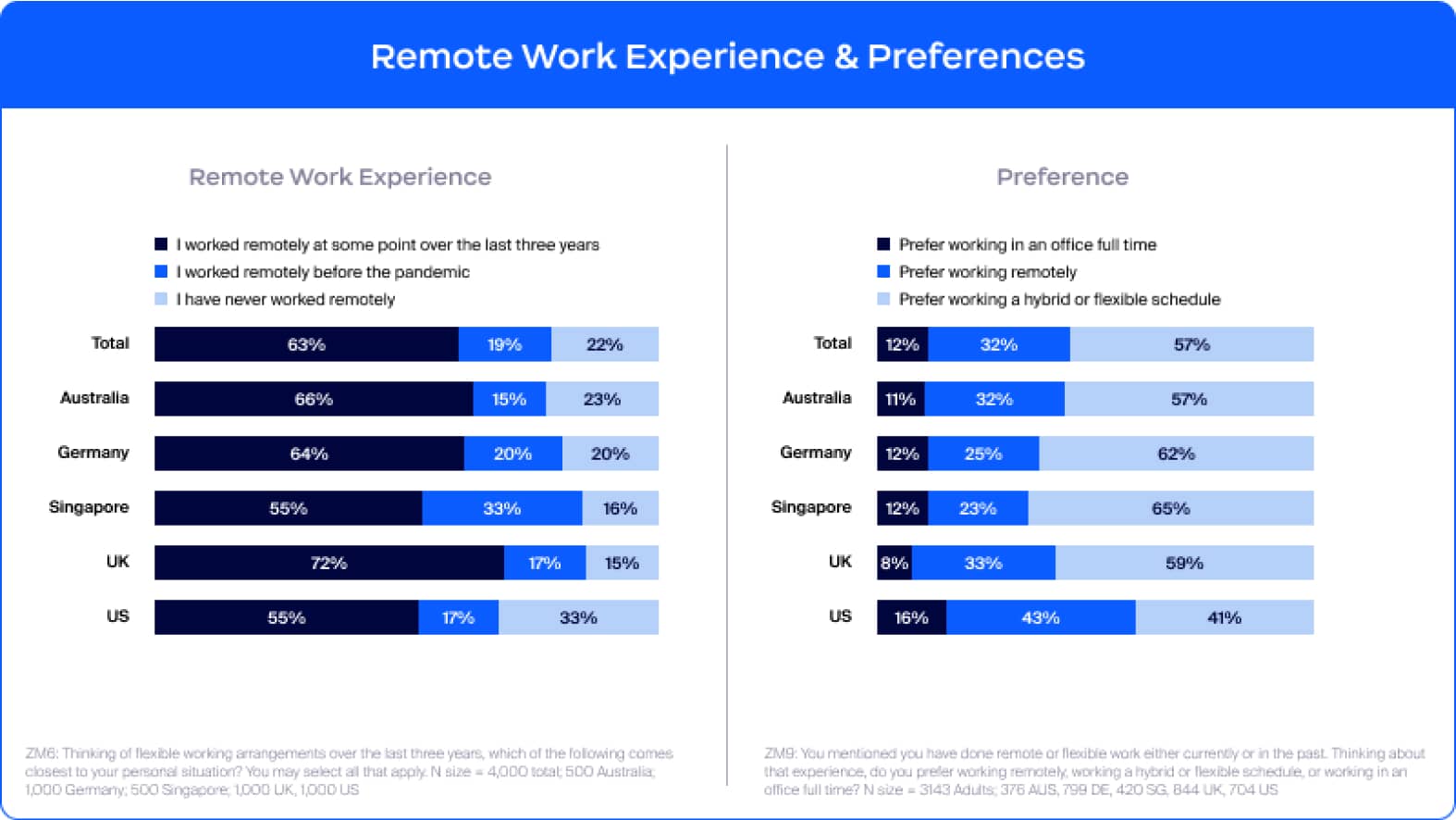
Location is important to our respondents when it comes to flexibility at work, but so is the ability to adjust your schedule to your personal needs.
When asked about what flexible work really means, the flexibility to work where you want and adjust your work schedule as needed are almost equally important to respondents. Across all surveyed countries, 59% of respondents believe flexible work means working where you want, and 65% believe it means adjusting your schedule as needed.
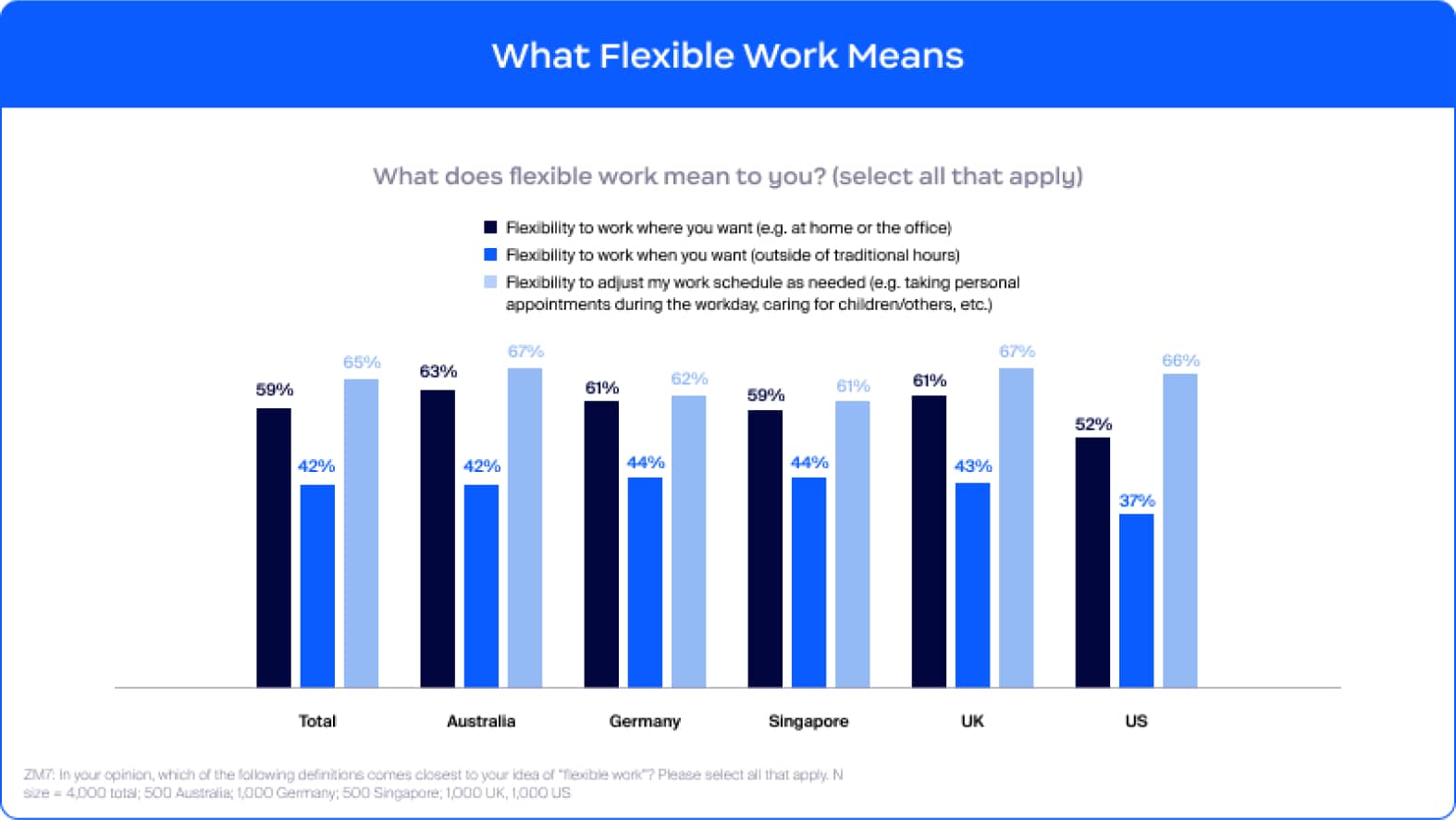
How flexible work impacts employee engagement and retention

Flexibility offers benefits that extend beyond what you might find in an HR pamphlet. Flexible work trims down commute times, allows you to spend more with loved ones, and keeps us more productive and engaged at work, according to the survey findings.
Respondents found many aspects of work are better remotely, including fewer expenses (72%), more time with family (71%), better work/life balance (61%), better mental health (48%), and more productivity/focus (38%).
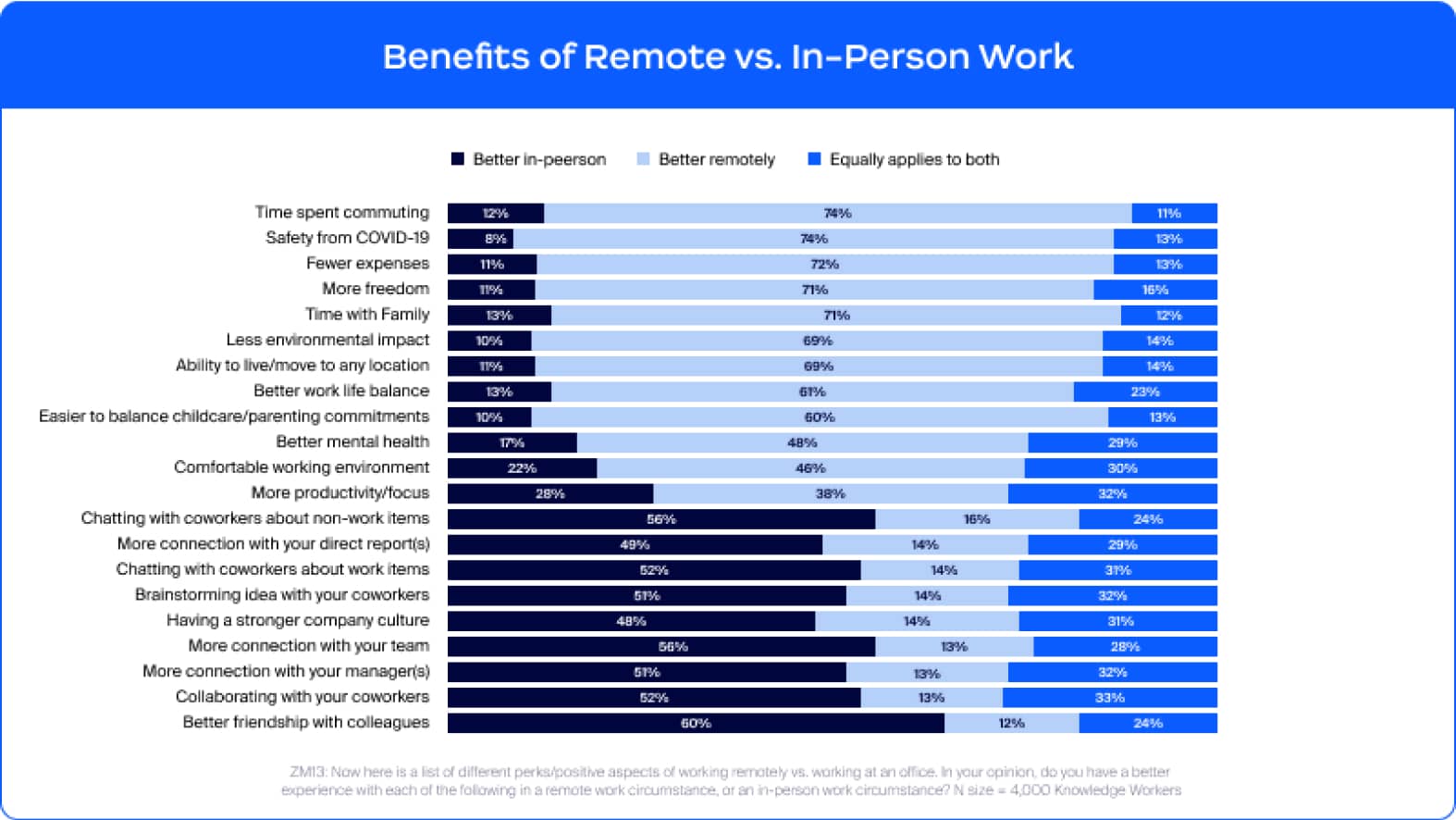
However, flexible work doesn’t just benefit individual employees — companies who adopt these policies can reap the rewards of a happier, engaged, and dedicated workforce contributing to the bottom line. Those that don’t could potentially see an exodus.
86% of respondents strongly or somewhat agree that flexible work makes them happier employees, whereas 70% strongly or somewhat agree that they would consider leaving a job for another company if it meant they would have a more flexible working environment.
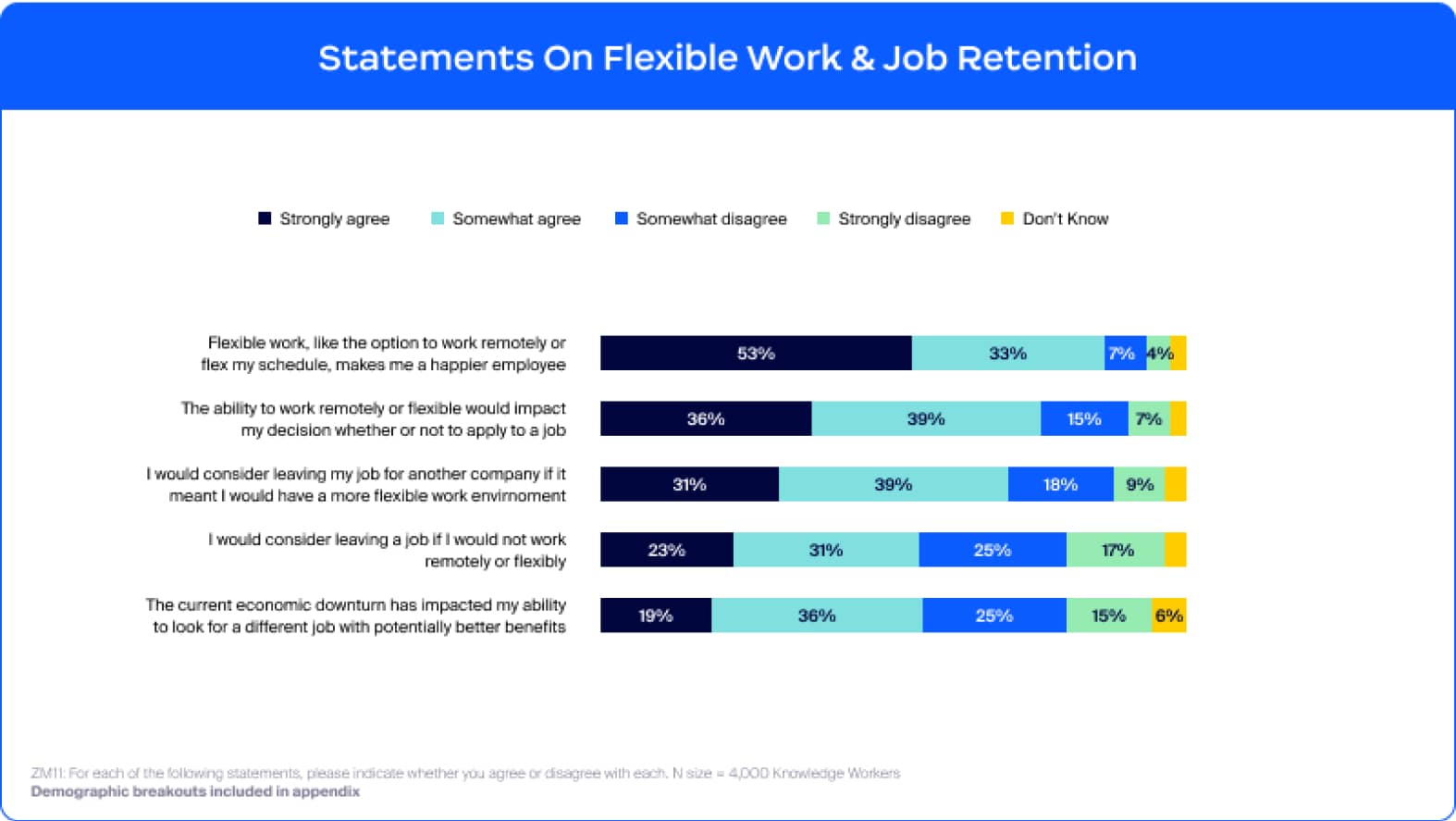
If employees have the ability to opt for remote or flexible work, they’re more likely to work for a company. A total of 84% of all respondents would be much more or somewhat more likely to work for a company that offers remote or flexible work.
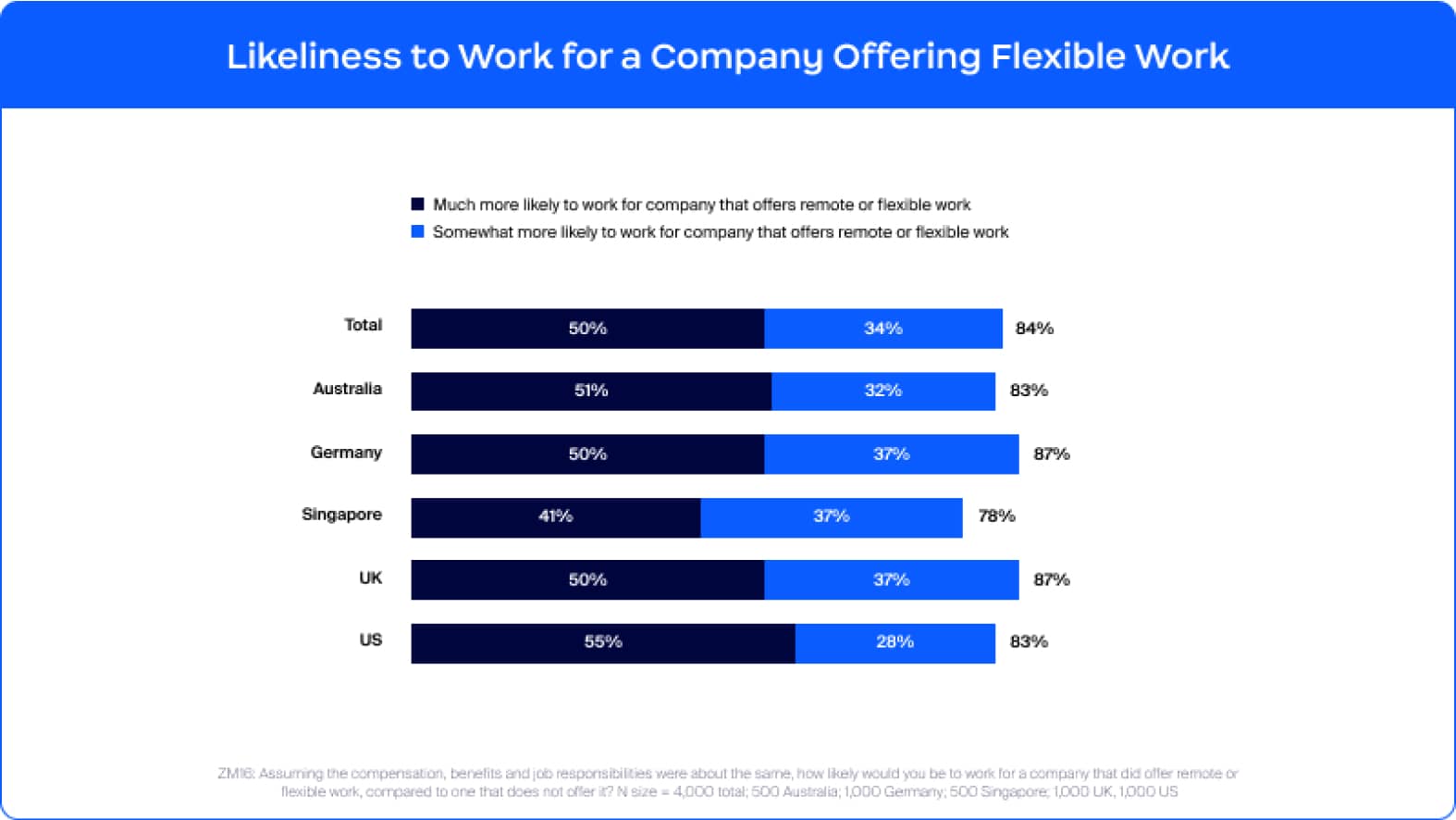

Agile solutions that support flexible work
Provide your employees with tools that enhance both flexibility and productivity, regardless of their work location. That starts with identifying and implementing solutions that meet them where they are and help enable meaningful connection, effective communication, and efficient collaboration regardless of location.
Zoom One offers that level of efficiency and agility. Our bundle streamlines the way you connect and collaborate by bringing together phone, meetings, chat, whiteboard, and more into a single, cost-effective platform. Whether you want to share information in a pinch over Zoom Team Chat or make an important call while you’re on the road with Zoom Phone, Zoom One enables the flexibility today’s employees crave while supporting the efficiency leaders need.
Methodology
This survey was conducted among 4,000 knowledge workers across the following markets: U.S., U.K., Germany, Australia, and Singapore. Knowledge workers were defined as clerical workers who have a full-time job in the private sector, in government, or in the nonprofit sector.
This survey was fielded among those in the U.S., U.K., Germany, Australia, and Singapore from February 3 – 24, 2023. Data in this survey were weighted to match an approximate proportion of knowledge workers per country. The margin of error for this study is +/- 2% for all countries, +/- 3% for the U.S., U.K., and Germany, and +/- 4% for Australia and Singapore. The margin of error is smaller within subgroups.